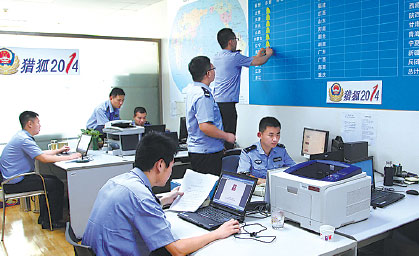Hunting down financial suspects hiding overseas
By Zhang Yan (China Daily) Updated: 2014-12-31 07:44
|
Anti-corruption investigators work on the 'Fox Hunt 2014' campaign in Beijing's financial street in August. Provided to China Daily |
Since March of this year, it has conducted three rounds of inspections. In early December, it sent inspectors to 13 central government ministries, agencies and companies, including the Ministry of Culture, Sinopec and China Unicom, to check the conduct of officials.
Between March and October, the central inspection teams found more than 400 cases of graft involving bureau-level officials in just three places - Tianjin municipality and Hainan and Shandong provinces.
Seventy-four senior directors of State-owned enterprises have also been probed so far this year. Those included China National Petroleum Corp's former chairman Jiang Jiemin; China Resources Group's former chairman Song Lin; and Xue Wandong, the former manager of a petroleum engineering technology subsidiary of Sinopec.
The CCDI has also set up a hotline, e-mail address and special mobile phone number to gather information from the public regarding corruption.
"The anti-graft inspectors have clear goals and will focus on investigating important leads on corrupt officials," said Chen Gang, a law professor at Renmin University of China. "They have tried to employ more convenient channels like short messages to motivate the public to offer information."
The CCDI will also open supervision offices, with teams-based permanently to cover all 140 central Party and State organs, Chen Wenqing, deputy secretary of the CCDI, said during an earlier online interview.
"Deploying inspection teams to all Party and government agencies will enhance regular supervisory capacity and help prevent and curb corruption at its root," he said.
The inspectors will first be deployed to seven government and Party bodies, including the CPC Central Committee's General Office, the General Office of the State Council, the Organization Department and the United Front Work Department.
Supervisors will also be sent to the National People's Congress, the National Committee of the Chinese People's Political Consultative Conference and the Publicity Department.
"The extension of supervision to all central Party and government agencies shows that the central government is adopting a zero-tolerance attitude toward corruption," said Pi Yijun, a law professor at China University of Political Science and Law. "The new measure will minimize the risk of corruption and prevent major cases from occurring in the future."
Thousands punished
The Party's Central Committee has put forward a set of clean governance rules - including requirements to lead a frugal life and cut expenses for government vehicles, receptions and overseas trips-that cover official behavior at all levels.
Between January and November, the disciplinary authorities punished more than 60,000 government officials for breaking the rules - twice the number of the previous year, CCDI figures show.
A typical case occurred in June, when the CCDI announced that Duan Xinhong, a prosecutor with the Linfen City People's Procuratorate in Shanxi province, had been sacked for accepting 52,400 yuan from 143 people during his father's funeral last November.
"Wewill enhance the at tack on corruption in some of the worst-hit sectors, including construction, land transfers and minerals, and curb graft by low-level officials and those who abuse their power by colluding with enterprises," the CCDI said.
Hong Daode, a law professor at China University of Political Science and Law, said that the increasing number of "tigers and flies" probed by the top anti-graft watchdog reflected the central government's determination to fight corruption.
The central authorities should also "promote a mechanism for officials to publicize their private property, including their bank savings and houses, and tighten supervision on 'naked officials' to prevent them from escaping abroad", he said.
"The anti-graft fight will become standard," Renmin's Chen Gang said. "After completing investigations within the Party, the disciplinary officers will immediately transfer officials suspected of corruption to the prosecuting departments to face trial."
- Govt encourages people to work 4.5 days a week
- Action to be taken as HIV cases among students rise
- Debate grows over reproductive rights
- Country's first bishop ordained in 3 years
- China builds Tibetan Buddhism academy in Chengdu
- Authorities require reporting of HIV infections at schools
- Typhoon Soudelor kills 14 in East China
- Police crack down on overseas gambling site
- Debate over death penalty for child traffickers goes on
- Beijing to tighten mail security for war anniversary








